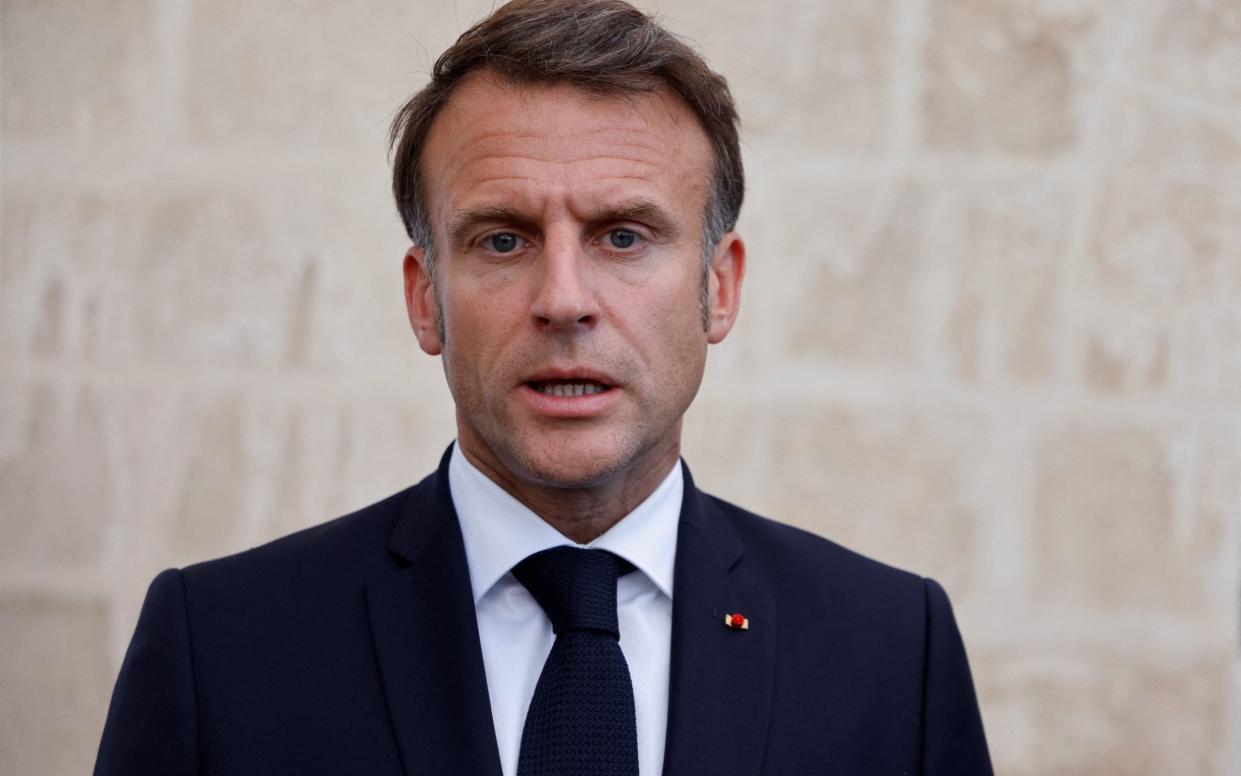France is heading for a financial crisis that could bring down the eurozone

It will expose the Right to all the pressures of office. It will split a fractious opposition. And it will give his party a chance to rebuild ahead of the 2027 presidential election. No doubt France’s famously wily president Macron thought through his decision to call a snap election following catastrophic results in the European polls.
Yet as the dust settles, one point is already clear. Whatever that plan was, it has backfired spectacularly. With the yield on France’s massive debts rising, and with equities crashing, Macron has lit the fuse on a eurozone debt crisis – and he won’t be able to put it out.
It was not the outcome he was looking for. In the elections for the European Parliament, Macron’s centrist Renaissance party slumped to just 14.6pc of the vote, while Marine Le Pen’s National Rally (RN) took more than 30pc. Macron has now called a general election, held over two rounds, with the final votes on July 7.
It looks certain that he will lose, with opinion polls showing the National Rally only just short of an overall majority, and with a united Left in second place, and Macron’s centrists relegated to third. Indeed, some polling shows Renaissance reduced to 40 or 50 seats. It would be a humiliation for Macron, leaving him to limp on in office for a couple of miserable years, or else to resign as Charles De Gaulle did in 1969.
True, French politics is often chaotic, and parties rise and fall. But this time around, it is the reaction of the financial markets – ordinarily detached from political shenanigans – that is most troubling. On Monday morning French bonds and equities tumbled, and they have carried on falling steadily ever since. The spread between French and German 10-year government bonds, the key measure of the country’s risk, witnessed its biggest weekly spike since 2011, right at the start of the Greek crisis.
The CAC-40 quickly dropped 6pc, even as global stocks were hitting fresh highs, and the market was down by another 2.4pc on Friday.
Shares in banks such as Société Générale dropped more than 5pc on Monday, while the euro fell against the dollar to hit a one-month low, and even against what has been sneeringly described in Paris as the “Great British Peso”, it slumped to its lowest since 2022. No one is hitting the panic button yet, but investors are starting to get out.
It is not hard to understand why.
In reality, a French debt crisis has been simmering for years. Its credit rating has been downgraded twice in the last six months. The overall debt burden has soared to 112pc of GDP. It now ranks third in the world for total outstanding debt, behind only Japan and the United States, both far larger economies that also have their own currency.
It has not balanced the budget for 50 years, and even with the eurozone economy recovering from the pandemic, it is still running a deficit of 5.1pc of GDP this year, well ahead of its forecast level.
Meanwhile, its economy has stalled, with growth of only 0.2pc in the latest quarter, less than half the level in Britain, which of course is also one of the weakest economies in the world. The ratings agencies did not have much confidence in the ability of Macron’s finance minister Bruno Le Maire to deliver the €20bn (£17bn) of spending cuts promised. They will have even less in whoever ends up as his replacement.
The National Rally that looks set to form the next government might be described as “far Right” but such claims are incompatible with its economic programme.
It has pledged to lower the retirement age again (taking it dramatically below European averages), erect barriers to imports that will amount to a tax on French consumers, and hand out subsidies with a lavish abandon.
In the past, it has flirted with leaving the euro, a move that might benefit the economy in the long-term, but would be catastrophic for investors. Many analysts, plus the finance minister, are warning of a “Liz Truss moment”, referring to the crisis in the bond markets that ultimately led to her departure from Downing Street in 2022. But it could be a lot worse than that.
While Truss was quickly replaced, a freshly elected RN government may not be so easy to remove. How would they respond to a crash? Perhaps with capital controls, even if they are banned within the eurozone.
Perhaps with a draconian clampdown on speculators, or with demands that the European Central Bank step into the market with a massive programme of bond buying – even at the risk of sparking a fresh round of inflation.
One point is certain, however. There are no good outcomes. For far too long, France has been living more wildly beyond its means than Britain and many other European countries, building up massive debts to subsidise an economy where the state is too big, and welfare too generous.
The crunch point now looks as if it will arrive very soon. President Macron is igniting a fresh eurozone debt crisis, one that will rival – perhaps even surpass – the Greek chaos of 2011 and 2012.
As PM Sir Keir Starmer and his chancellor Rachel Reeves will have to deal with the fall-out from a financial crisis on the other side of the Channel. Does anyone believe they are up to the job?

 Yahoo News
Yahoo News 
